|
|
|
Sort Order |
|
|
|
Items / Page
|
|
|
|
|
|
|
| Srl | Item |
| 1 |
ID:
082704
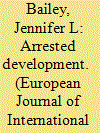

|
|
|
|
|
| Publication |
2008.
|
| Summary/Abstract |
The International Whaling Commission's moratorium on commercial whaling took effect in 1986, seemingly marking the adoption of a new norm, that commercial whaling was no longer acceptable. But this norm has failed to become institutionalized. This article uses the norm life-cycle approach as developed by Finnemore and Sikkink (1998) to account for this failure. The effort ran aground because the norm proved unexpectedly ambiguous, a supporting epistemic community failed to emerge, the norm conflicted with other powerful norms, the prestige of the key anti-whaling states declined relative that of whaling states, and NGO tactics failed to win over the publics in key whaling states and instead created a counter-boomerang effect. The attempt may have resulted in the emergence of an alternative norm, but actors must act now to institutionalize it.
|
|
|
|
|
|
|
|
|
|
|
|
|
|
|
|
| 2 |
ID:
127343
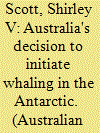

|
|
|
|
|
| Publication |
2014.
|
| Summary/Abstract |
On May 31, 2010, Australia instituted proceedings before the International Court of Justice in the case of Whaling in the Antarctic (Australia v. Japan). Although Australian politicians had for some time threatened such a course of action, the decision to proceed with international litigation took many observers by surprise, most basically because Japan appeared to be in a strong legal position and the risks associated with the case appeared greater than Australia's prospects for success. This article examines the background to the whaling dispute and suggests two ways in which litigation in the World Court may contribute to resolution of the dispute no matter the legal outcome of the case.
|
|
|
|
|
|
|
|
|
|
|
|
|
|
|
|
| 3 |
ID:
192473
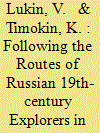

|
|
|
|
|
| Summary/Abstract |
THE Russian Empire significantly strengthened its positions in the early 19th century by defeating Napoleonic France and playing a key role in the Congress of Vienna - a series of meetings in 1814-1815 that repaired monarchical regimes undermined by the Great French Revolution of 1789-1799 and established a new political and legal order for Europe.
|
|
|
|
|
|
|
|
|
|
|
|
|
|
|
|
| 4 |
ID:
168379
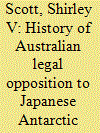

|
|
|
|
|
| Summary/Abstract |
Whaling has been a consistent theme in Australia’s relations with Japan since the 1930s, Australia having endeavoured to regulate, restrict, or bring to a complete halt Japan’s Antarctic whaling virtually since it began. Australia’s motivations have been mixed, involving at various points, some combination of protection of Australia’s coastal whaling industry, concern for Australia’s security, for safeguarding Australia’s Antarctic territorial claim, and more recently, concern for Australia’s whale-watching industry and/or for the whales. Since environmental consciousness became a primary factor in the 1970s, Australian policy has been aligned with that of anti-whaling non-governmental organizations (NGOs), albeit that certain actions of NGOs have caused difficulties for the Australian Government. Law – inclusive of legal argument in the course of diplomacy, domestic laws, and international litigation – has been a mechanism of influence used by the Australian Government and NGOs. This paper traces Australia’s legal opposition from its beginnings until Japan’s announcement in December 2018 that it would end Antarctic whaling.
|
|
|
|
|
|
|
|
|
|
|
|
|
|
|
|
| 5 |
ID:
184769
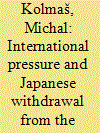

|
|
|
|
|
| Summary/Abstract |
Shaming in international relations has been extensively analysed as a normative practice that aims to persuade the target to comply with certain norms. Recently, IR scholars have identified cases, in which this process failed or antagonised the target. But although these studies have shown us how shaming works, they have not fully explained under what conditions shaming works. To remedy this, the article analyses the role of shaming in Japanese whaling controversy. In 2018, Japan announced its withdrawal from the International Whaling Commission, defying three decades of sustained international pressure. I identify two versions of shaming of Japanese whaling: premoratorium ‘soft' and post-moratorium ‘hard' shaming. The former, although less confrontational, had normative impact on Japanese society and policymaking, leading Tokyo to accept the moratorium and scale down on its whaling operations. The latter, marked by attacks of NGOs and heated discourse, had an opposite outcome and helped conservative policy entrepreneurs formulate a ‘cultural wars’ narrative that prevented the inception of anti-whaling norm. The reason for this difference, I argue, lies in Japanese domestic political culture, which played a defining role in the success/fail of shaming strategies. For shaming to be successful then, careful understanding of the target society is essential.
|
|
|
|
|
|
|
|
|
|
|
|
|
|
|
|
| 6 |
ID:
188226
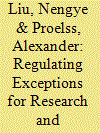

|
|
|
|
|
| Summary/Abstract |
This article examines the concepts of “research fishing” and “directed fishing” under the Ross Sea region Marine Protected Area (RSrMPA) with specific regard to MPAs as a conservation tool, drawing comparisons with related concepts contained in two other agreements, namely, the 1946 International Convention for the Regulation of Whaling (ICRW) and the 2018 Agreement to Prevent Unregulated High Seas Fisheries in the Central Arctic Ocean (CAOF Agreement). It first reviews the negotiation processes of the RSrMPA, focusing on debates between so called “fishing states” and “conservation states,” as well as the political compromise that led to the establishment of the RSrMPA. Second, it takes a detailed look at the regulation of “research fishing” and “directed fishing,” which may be conducted in the RSrMPA and the three zones into which it is divided. Third, it analyzes how “scientific research activities” and “exploratory fishing” are regulated in the CAOF Agreement. Thereafter, this article examines the role of the concept of whaling “for purposes of scientific research” under the ICRW. It concludes with an assessment of differences and similarities between the analyzed regulatory instruments, which identifies recommended lessons for the design of Conservation and Management Measures establishing MPAs that both reflect the precautionary approach and strike a balance between conservation and utilization.
|
|
|
|
|
|
|
|
|
|
|
|
|
|
|
|
| 7 |
ID:
098441
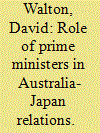

|
|
|
|
|
| Publication |
2010.
|
| Summary/Abstract |
In the post-war period Australian Prime Ministers have played a proactive role in formulating foreign policy towards Japan. This paper explores the role of executive leadership towards Japan and its impact on the bilateral relationship. The Howard period and current Rudd-led initiatives on whaling, nuclear disarmament, climate change and regional architecture are discussed.
|
|
|
|
|
|
|
|
|
|
|
|
|
|
|
|
| 8 |
ID:
160372
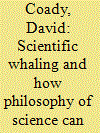

|
|
|
|
|
| Summary/Abstract |
Despite widespread public interest on the topic of whaling, there is at present relatively little work on how philosophy might contribute to analysis of the status of whaling in international law. When philosophers have looked at the topic of whaling, they have confined their attention to a fairly narrow set of ethical questions, such as whether international law should permit certain forms of traditional indigenous whaling or extend legal rights to whales themselves. However, there is another important issue which has so far been largely neglected by philosophy, even though it is at the forefront of current international legal disputes over the status of whaling: the issue of so-called ‘scientific whaling’. This article considers the international legal dispute between Australia, New Zealand and Japan over the latter’s lethal harvesting of whales in the Southern Ocean, and the recent attempt at resolution by the International Court of Justice. On its face, this required that the Court demarcate ‘scientific’ from ‘unscientific’ activity; however, it effectively baulked at this task. The authors argue that this approach of the Court was unfortunate, and that demarcating science from commerce is not only achievable in philosophy, but might also inform international legal practice. Resolving this issue is important for genuine progress to be made in the current international stand-off over Japanese whaling in the Southern Ocean.
|
|
|
|
|
|
|
|
|
|
|
|
|
|
|
|
| 9 |
ID:
114086
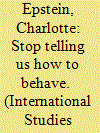

|
|
|
|
|
| Publication |
2012.
|
| Summary/Abstract |
In this paper, I use a phenomenon of resistance to a global norm as a catalyst to critically re-examine the cognitive frames underpinning the use of the concept of socialization in international relations. My critique, which adds to the now growing critique of constructivism's neglect of the role of power in the international system, is threefold. First, socialization tends to be apprehended as a bettering of the socializee, because of an implicit teleological assumption of change as progress. Second, the concept tends to frame out the perspective of the socializee. Third and relatedly, it infantilizes the socializee. I use the international politics of whaling to illustrate the practical and conceptual effects of this infantilization of the socializee and specifically the ways it curtails both policymaking and scholarly research. The purpose of my efforts here are not to discount the usefulness of "socialization" in understanding norm dynamics but to caution against these three particular forms of silencing effected by the epistemological apparatus that has taken shape around it.
|
|
|
|
|
|
|
|
|
|
|
|
|
|
|
|
| 10 |
ID:
105952


|
|
|
|
|
| Publication |
2011.
|
| Summary/Abstract |
This article aims to show the theoretical added value of focussing on discourse to study identity in international relations (IR). I argue that the discourse approach offers a more theoretically parsimonious and empirically grounded way of studying identity than approaches developed in the wake of both constructivism and the broader 'psychological turn'. My starting point is a critique of the discipline's understanding of the 'self' uncritically borrowed from psychology. Jacques Lacan's 'speaking subject' offers instead a non-essentialist basis for theorizing about identity that has been largely overlooked. To tailor these insights to concerns specific to the discipline I then flesh out the distinction between subject-positions and subjectivities. This crucial distinction is what enables the discourse approach to travel the different levels of analyses, from the individual to the state, in a way that steers clear of the field's fallacy of composition, which has been perpetuated by the assumption that what applies to individuals applies to states as well. Discourse thus offers a way of studying state identities without presuming that the state has a self. I illustrate this empirically with regards to the international politics of whaling.
|
|
|
|
|
|
|
|
|
|
|
|
|
|
|
|
|
|
|
|
|